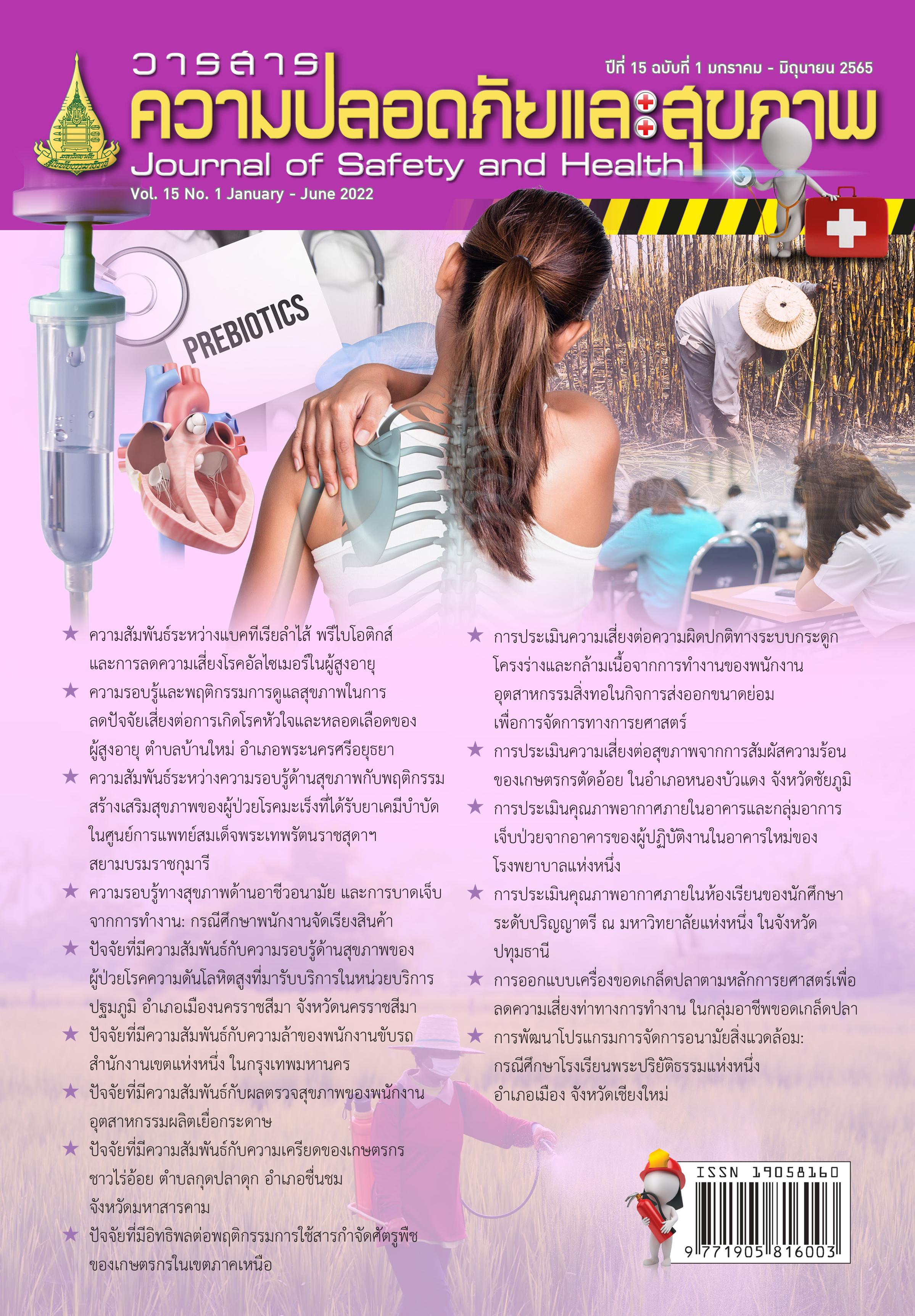ความสัมพันธ์ระหว่างแบคทีเรียในลำไส้ พรีไบโอติกและการลดความเสี่ยง โรคอัลไซเมอร์ในผู้สูงอายุ
Main Article Content
บทคัดย่อ
การเปลี่ยนแปลงขององค์ประกอบของจุลินทรีย์ที่ไม่สมดุล (gut dysbiosis) ในลำไส้ของผู้สูงอายุสามารถพัฒนาให้เกิดโรคอัลไซเมอร์จากความสัมพันธ์ระหว่างสมองและลำไส้ที่มีการสื่อสารแบบสองทิศทาง โดยแบคทีเรียบางกลุ่มที่พบในลำไส้สามารถผลิตสารเมทาบอไลต์ที่เป็นพิษต่อเซลล์ประสาท ได้แก่ ลิโปโพลีแซคคาร์ไรด์ (lipopolysaccharide; LPS) และ β-N-methylamino-L-alanine (BMMA) และ เบต้า-อะไมลอยด์ (β-amyloids) เป็นต้น ส่งผลต่อเกิดการอักเสบและการตายของเซลล์ประสาทในระบบประสาทส่วนกลางผ่านวิถีหรือช่องทางต่างๆ การบริโภคอาหารกลุ่มพรีไบโอติกหรือใยอาหารจากผัก ผลไม้ และธัญพืช สามารถกระตุ้นแบคทีเรียที่ผลิตกรดไขมันสายสั้นหรือจุลินทรีย์กลุ่มโพรไบโอติก แบคทีเรียดังกล่าวสามารถผลิตสารเมทาบอไลต์ต่อต้านการอักเสบและลดการผ่านเข้าไปของ สารเมทาบอไลต์ที่เป็นพิษต่อเซลล์ประสาท จึงอาจช่วยป้องกันความเสี่ยงการเกิดของโรคอัลไซเมอร์ที่มีสาเหตุจากความไม่สมดุลของจุลินทรีย์ในผู้สูงอายุได้
Article Details
Journal of Safety and Health is licensed under a Creative Commons Attribution-NonCommercial-NoDerivatives 4.0 International (CC BY-NC-ND 4.0) licence, unless otherwise stated.
เอกสารอ้างอิง
วิชัย เอกพลากร.(2557).การสำรวจสุขภาพประชาชนโดยการตรวจร่างกาย ครั้งที่ 5 พ.ศ. 2557.นนทบุรี: สถาบันวิจัยระบบสาธารณสุข.น. 250-53
สำนักงานสถิติแห่งชาติ.(2561). รายงานการสำรวจประชากรสูงอายุในประเทศไทย พ.ศ.2560
อัญชลี ศรีจำเริญ.(2561). อาหารและโภชนาการ การป้องกันกลไกบกพร่อง.กรุงเทพมหานคร: สำนักพิมพ์
แห่งจุฬาลงกรณ์มหาวิทยาลัย.
Busnelli, M., Manzini, S., & Chiesa, G. (2020). The Gut Microbiota Affects Host
Pathophysiology as an Endocrine Organ: A Focus on Cardiovascular Disease. Nutrients. 12(79), 1-32.
Carabotti, M., Scirocco, A., Maselli, M.A. & Severi, C. (2015). The gut-brain axis:
interactions between enteric microbiota, central and enteric nervous systems. Annals of Gastroenterology. 28(2), 203-209.
Conte, C., Sichetti, M. & Traina, G. (2020). Gut–Brain Axis: Focus on neurodegeneration
and mast cells. Applied Sciences. 10 (1828), 2-19.
Dinan, T.G., Stilling, R.M., Stanton, T. & Cryan, J.F. (2015). Collective unconscious: How
gut microbes shape human behavior. Journal of Psychiatric Research. 63(2015), 1-9.
Dalile, B., Oudenhove, L.V., Vervliet, B. & Verbeke, K. (2019). The role of short- chain
Fatty acids in microbiota–gut–brain communication. Nature Reviews gastroenterology & hepatology. 16 (2019): 461-478.
Kowalski, K & Mulak, A. (2019). Brain-gut microbiota axis in Alzheimer’s disease. Journal of
neurogastroenterol Motil. 25(1), 48-60.
Lina, C., Zhao, S., Zhua, Y., Fana, Z., Wang, J., Zhang, B. & Chen, Y. (2019). Microbiota-
gut-brain axis and toll-like receptors in Alzheimer’s disease. Computational and Structural Biotechnology Journal. 17 (2019), 1309–1317.
Long, J.M. &Holtzman, D.M. (2019). Alzheimer Disease: An Update on Pathobiology and Treatment
Strategies. Cell. 179(2), 312-339.
Parker, A., Fonseca, S. & Carding, S.R. (2020). Gut microbes and metabolites as modulators
of blood-brain barrier integrity and brain health. Gut Microbes. 11(2), 135–157.
Rinninella, E., Raoul, P., Cintoni, M., Franceschi, F., Miggiano, G.A.D., Gasbarrini, A.&
Mele, M.C. (2019). What is the Healthy Gut Microbiota Composition? A Changing Ecosystem across Age, Environment, Diet, and Diseases. Microorganisms. 7(14), 17-22.
Sarkar, S.R. & Banerjee, S. (2019). Gut microbiota in neurodegenerative disorders. Journal
of Neuroimmunology. 328 (2019), 98–104.
Silva, Y.P., Bernardi, A. & Luiz, R. (2020). The role of short-chain fatty acids from gut
microbiota in gut-brain communication. Frontiers endocrinology. 11(2020), 1-14.
Thursby, E. & Juge, N.(2017). Introduction to the human gut microbiota. Biochemical
Journal. 474(11), 1823–1836.
Vinolo, M.A.R., Rodrigues, H.G., Nachbar, R.T. & Curi, R. (2011). Regulation of
inflammation by short chain fatty acids. Nutrients. 3(10), 858-876.
Westfall, S., Lomis, N., Kahouli, I., Dia, S.Y., Singh, S.P. & Prakash, S. (2017).
Microbiome, probiotic and neurodegenerative diseases deciphering the gut brain axis. Cellular and Molecular Life Sciences. 2017 (74), 3769-3787.
Wu, W., Kong, Q., Tian, P., Zhai, Q., Wang, G., Liu, X., Zhao, J., Zhang, H., Lee, Y.K. &
Chen, W. (2020). Targeting Gut Microbiota Dysbiosis: Potential Intervention Strategies for Neurological Disorders. Engineering. 6(4), 415-423.
Zhao, Y., Jaber, V. & Lukiw, W.J. (2017). Secretory products of the human GI tract
microbiome and their potential impact on Alzheimer's disease (AD): Detection of lipopolysaccharide (LPS) in AD hippocampus. Front Cellular and Infection Microbioly. 7(318): 1-9.

